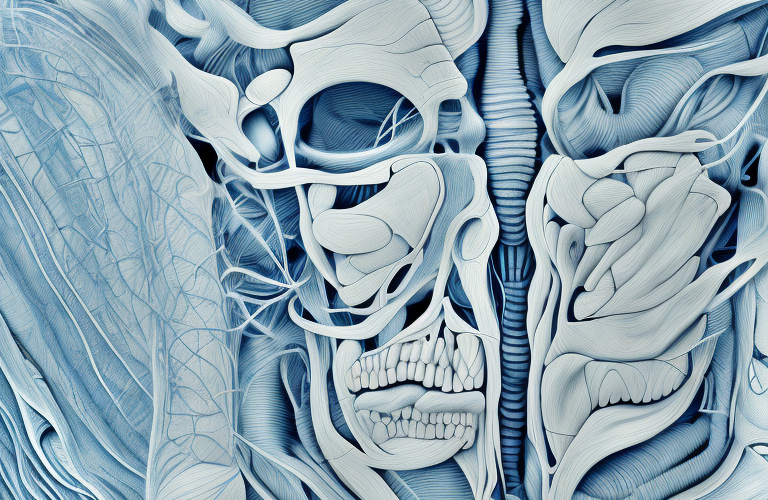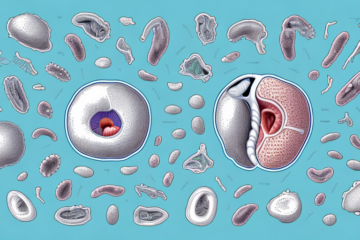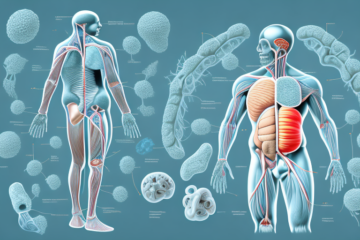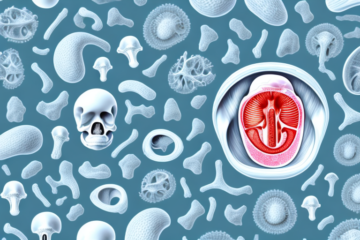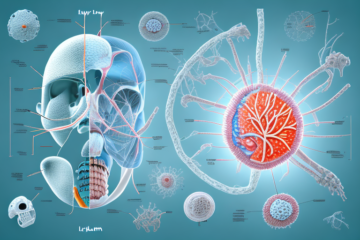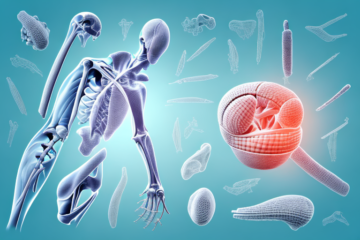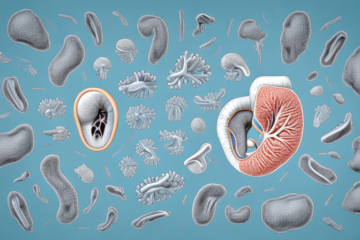Our skin is the largest organ of the body and plays a pivotal role in protecting us from external elements and regulating internal temperature. Its complex anatomy and multifunctional nature make skin a crucial aspect to understand for overall health and wellness.
Understanding the Role of Skin in the Human Body
Firstly, it’s important to know that skin isn’t just a covering for our bodies. It is responsible for several essential functions, including protection against harmful UV rays, injuries, and infections. Additionally, skin has sensory receptors that allow us to perceive touch, pressure, temperature, and pain. It also helps regulate our body temperature, allowing us to sweat and cool down or retain heat when we are cold.
Moreover, the skin plays a crucial role in the synthesis of vitamin D, which is essential for maintaining healthy bones and teeth. When exposed to sunlight, the skin produces vitamin D, which is then transported to the liver and kidneys for activation. Without adequate exposure to sunlight, the body may not produce enough vitamin D, leading to a deficiency that can cause various health problems.
The Complex Anatomy of the Skin Explained
The skin has three layers: the epidermis, dermis, and hypodermis (also called subcutaneous tissue). The epidermis is the outermost layer and acts as a barrier against harmful external substances and microorganisms. The dermis lies beneath the epidermis and contains blood vessels and nerve cells, which supply nutrients to the skin’s layers. The hypodermis is the deep layer that mostly consists of fat cells, which provide insulation, energy storage, and cushioning for the underlying bones.
In addition to these three layers, the skin also contains various structures such as hair follicles, sweat glands, and sebaceous glands. Hair follicles are responsible for producing hair, while sweat glands produce sweat to regulate body temperature. Sebaceous glands produce sebum, an oily substance that helps to moisturize and protect the skin. These structures are all interconnected and work together to maintain the health and function of the skin.
Layers of the Skin: Epidermis, Dermis and Hypodermis
Each layer of the skin has a specific function that contributes to the overall protection and maintenance of the body. The epidermis has five sub-layers, including the stratum corneum, which is the thickest and outermost layer, composed mostly of dead skin cells that act as a protective barrier. The dermis contains collagen and elastin fibers that provide the skin with its strength and elasticity, as well as nerve endings, hair follicles, and sweat glands that help regulate body temperature.
The hypodermis, also known as the subcutaneous layer, is the deepest layer of the skin. It is composed of adipose tissue, which acts as insulation and a source of energy storage for the body. The hypodermis also contains blood vessels and nerves that supply the skin and underlying tissues with nutrients and oxygen.
The skin is the largest organ of the body and plays a crucial role in protecting the body from external factors such as UV radiation, pathogens, and physical damage. It also helps regulate body temperature and plays a role in the immune system. Proper care and maintenance of the skin, including regular cleansing, moisturizing, and protection from the sun, can help keep it healthy and functioning properly.
The Different Types of Skin: Thin, Thick, Dry and Oily
There are different types of skin, ranging from thin to thick, dry to oily, and smooth to rough. Thin skin is typically more sensitive and prone to injuries, while thick skin is found in areas that are constantly exposed to friction, such as the soles of the feet. Dry skin tends to be itchy and flaky, while oily skin is prone to acne breakouts. Understanding your skin type is crucial when choosing skincare products and establishing a routine.
In addition to the four main types of skin, there are also combination skin types. Combination skin is characterized by having both dry and oily areas on the face. This can make it challenging to find the right skincare products that work for both areas. It’s important to pay attention to the specific needs of each area and choose products accordingly.
Another factor that can affect skin type is age. As we age, our skin becomes thinner and loses elasticity, making it more prone to wrinkles and sagging. It’s important to adjust your skincare routine as you age to address these changes and keep your skin looking healthy and youthful.
The Protective Barrier Function of the Skin
One of the most important functions of the skin is its barrier function. The stratum corneum, the outermost layer of the epidermis, protects the body from external elements such as UV rays and microorganisms, as well as water loss. It achieves this through a combination of overlapping skin cells, lipids, and other compounds that make up the skin’s natural moisturizing factors (NMFs).
In addition to protecting the body from external elements, the skin’s barrier function also plays a crucial role in maintaining overall skin health. When the barrier is compromised, whether through environmental factors or genetic conditions, the skin becomes more susceptible to irritation, inflammation, and infection.
There are several ways to support and strengthen the skin’s barrier function. One of the most important is to maintain proper hydration levels, both internally through adequate water intake and externally through the use of moisturizers. Additionally, avoiding harsh soaps and other irritants, as well as protecting the skin from excessive sun exposure, can help to keep the barrier intact and functioning optimally.
How Skin Regenerates Itself: The Process of Cell Renewal
The skin has a remarkable ability to regenerate and repair itself, thanks to a process called cell renewal. The cells in the epidermis are constantly dividing and renewing, allowing for the replacement of old and damaged skin cells with new ones. This process slows down as we age, which can lead to fine lines, wrinkles, and other signs of aging.
However, there are ways to boost the process of cell renewal and promote healthier, younger-looking skin. One way is through exfoliation, which helps to remove dead skin cells and stimulate the growth of new ones. Another way is to use skincare products that contain ingredients like retinol and vitamin C, which have been shown to increase cell turnover and collagen production.
It’s also important to protect your skin from damage that can slow down the process of cell renewal. This includes wearing sunscreen to prevent UV damage, avoiding smoking and excessive alcohol consumption, and maintaining a healthy diet and lifestyle. By taking care of your skin and promoting cell renewal, you can help to keep your skin looking youthful and radiant for years to come.
Factors That Affect Skin Health: Genetics, Age and Lifestyle
Several factors can affect skin health, including genetics, age, and lifestyle. Genetics plays a role in determining our skin type, tone, and texture, as well as our susceptibility to certain skin conditions such as eczema and psoriasis. Age brings about changes in the skin’s elasticity and thickness, while lifestyle factors such as diet, exercise, and sun exposure can impact the skin’s overall health and appearance.
In addition to genetics, age, and lifestyle, environmental factors can also affect skin health. Exposure to pollution, harsh chemicals, and extreme weather conditions can lead to skin damage and premature aging. It is important to protect your skin from these environmental stressors by using sunscreen, wearing protective clothing, and avoiding exposure during peak sun hours. Additionally, maintaining a consistent skincare routine that includes cleansing, moisturizing, and exfoliating can help keep your skin healthy and glowing.
Common Skin Conditions and Their Causes
There are numerous skin conditions that can affect people of all ages and skin types. Some of the most common skin conditions include acne, eczema, psoriasis, rosacea, and skin cancer. These conditions can be caused by a variety of factors such as genetics, lifestyle, and environmental factors like pollution and exposure to UV radiation.
Acne is a skin condition that is caused by the overproduction of oil in the skin, which can clog pores and lead to the formation of pimples and blackheads. Eczema is a condition that causes the skin to become red, itchy, and inflamed, and is often triggered by allergens or irritants. Psoriasis is a chronic autoimmune condition that causes the skin to become thick, red, and scaly, and is often triggered by stress or infections. Rosacea is a condition that causes redness and visible blood vessels on the face, and is often triggered by sun exposure, alcohol, or spicy foods. Skin cancer is a serious condition that is caused by damage to the DNA in skin cells, often as a result of exposure to UV radiation from the sun or tanning beds.
The Importance of Sunscreen for Skin Protection
One of the most effective ways to protect your skin is through the regular use of sunscreen. Sunscreen helps prevent skin damage and premature aging caused by UV radiation. It is recommended to use a broad-spectrum sunscreen with an SPF of at least 30, and to reapply every two hours when exposed to the sun for extended periods.
In addition to protecting your skin from UV radiation, sunscreen can also help prevent skin cancer. Skin cancer is the most common type of cancer in the United States, and exposure to UV radiation is a major risk factor. By using sunscreen regularly, you can significantly reduce your risk of developing skin cancer.
How to Care for Your Skin: Tips and Best Practices
Proper skincare is essential to maintain healthy skin. This includes cleansing, moisturizing, and protecting from environmental factors like UV radiation and pollution. It’s also important to avoid harsh skincare products and practices that can strip away the skin’s natural moisture and protective barrier.
In addition to the basics of cleansing, moisturizing, and protecting your skin, there are other steps you can take to improve your skin’s health. One important factor is diet – consuming a balanced diet with plenty of fruits and vegetables can provide your skin with essential vitamins and nutrients. Additionally, getting enough sleep and managing stress levels can also have a positive impact on your skin’s appearance and overall health.
Another important aspect of skincare is understanding your skin type and choosing products that are specifically formulated for your needs. For example, if you have oily skin, you may want to look for products that are oil-free and non-comedogenic to avoid clogging pores. On the other hand, if you have dry skin, you may need to use heavier moisturizers and avoid products with alcohol or fragrances that can further dry out your skin.
Skincare Products: Ingredients to Look For and Avoid
When choosing skincare products, it’s important to pay attention to the ingredients. Ingredients like retinol, vitamin C, and hyaluronic acid can help improve the skin’s texture and appearance, while harsh chemicals like fragrance and alcohol can irritate and damage the skin. Reading labels and doing research can help you choose products that are best suited for your skin type and concerns.
In addition to the ingredients mentioned above, there are other beneficial ingredients to look for in skincare products. For example, niacinamide can help reduce inflammation and redness, while glycolic acid can exfoliate and brighten the skin. It’s also important to consider the concentration of these ingredients, as higher concentrations may be more effective but can also be more irritating.
On the other hand, there are also ingredients to avoid in skincare products. These include sulfates, which can strip the skin of its natural oils, and parabens, which have been linked to hormone disruption. It’s also important to be cautious of products that claim to be “natural” or “organic,” as these terms are not regulated and can be misleading.
Natural Remedies for Common Skin Issues
Some natural remedies can help treat common skin issues without harsh chemicals. For example, aloe vera can soothe sunburned skin, while honey and oatmeal can help nourish dry and itchy skin. It’s essential to remember that natural remedies may not work for everyone and to consult with a healthcare professional before trying any new remedies.
In addition to aloe vera, honey, and oatmeal, there are other natural remedies that can help with various skin issues. Tea tree oil has antibacterial properties that can help with acne, while chamomile tea can soothe irritated skin. Coconut oil is also a popular natural remedy for moisturizing dry skin.
It’s important to note that while natural remedies can be effective, they should not replace medical treatment for serious skin conditions. If you have a persistent skin issue or notice any concerning changes in your skin, it’s best to consult with a dermatologist or healthcare professional for proper diagnosis and treatment.
The Future of Skincare: Innovative Technologies and Trends
The skincare industry is constantly evolving, with new technologies and trends emerging regularly. Some of the exciting innovations include personalized skincare based on DNA analysis, CBD-infused skincare products, and the use of probiotics to improve skin health. Keeping up with new trends and technologies can help you make informed decisions about your skincare routine.
Another trend that is gaining popularity in the skincare industry is the use of sustainable and eco-friendly ingredients. Consumers are becoming more conscious of the impact their choices have on the environment and are seeking out products that are made with natural, renewable resources. Brands are responding to this demand by using ingredients like bamboo, aloe vera, and green tea, which are not only good for the skin but also have a lower environmental impact than traditional ingredients.
Conclusion: Why Understanding Your Skin is Crucial for Overall Health
Understanding your skin’s anatomy, function, and needs is crucial for maintaining overall health and wellness. By protecting and nourishing your skin, you can help prevent premature aging, skin damage, and a host of other skin conditions. Taking care of your skin should be an essential component of your healthcare routine, allowing you to look and feel your best, both inside and out.
In addition to the physical benefits of taking care of your skin, there are also mental and emotional benefits. When you feel good about your skin, you feel more confident and self-assured. This can lead to improved relationships, increased productivity, and a better overall quality of life. By prioritizing your skin health, you are investing in yourself and your well-being.

